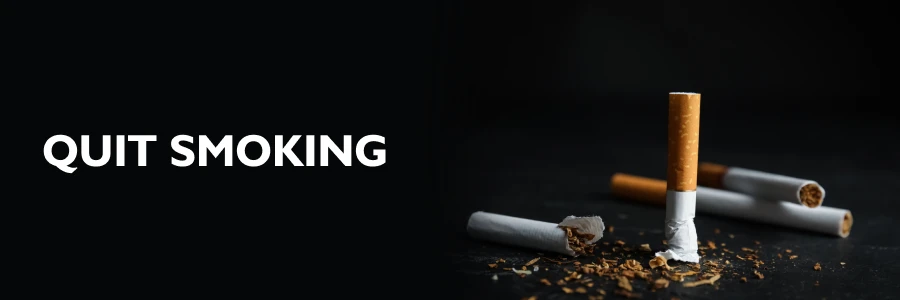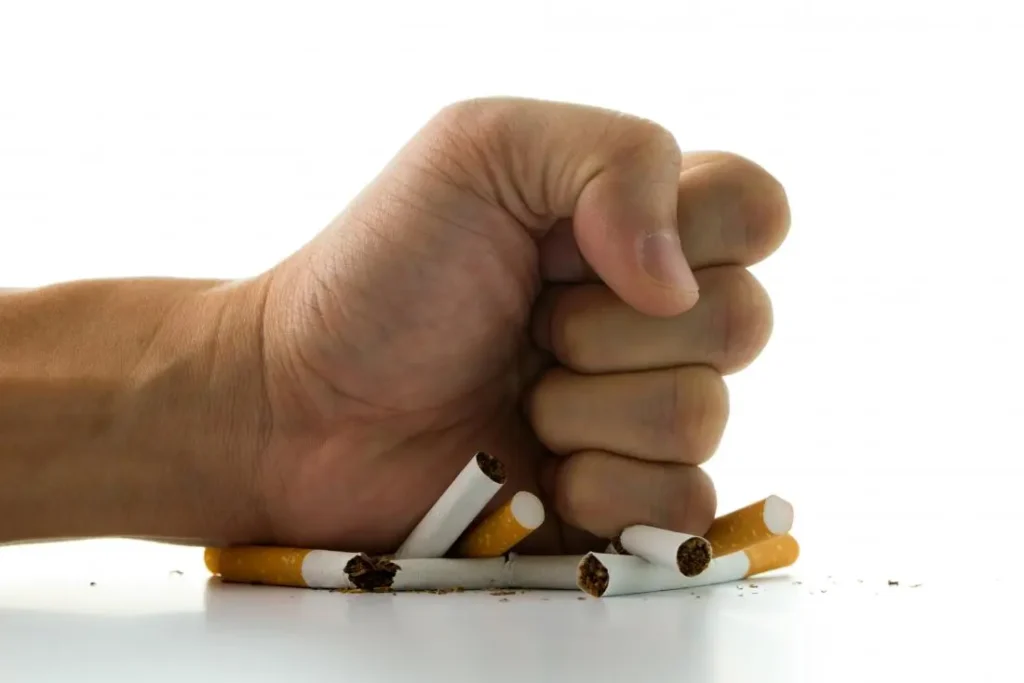Smoking is one of the leading causes of preventable health issues, yet many struggle to quit despite the risks. Breaking free from cigarettes isn’t easy, but it’s one of the most powerful steps you can take for your health—and for the people you care about.
The benefits start almost immediately and ripple through every aspect of your life, from better physical health to greater financial freedom and emotional well-being.
Here’s why quitting smoking is a decision that can truly change your life and your skin.
Key Notes
- Learn how quitting smoking benefits your health immediately and in the long term.
- Understand how smoking affects your skin, appearance, and aging process.
- Discover the financial advantages of quitting and how much you can save.
- Explore how smoking impacts your loved ones and the benefits of a smoke-free home.
- Find out about resources and tools that make quitting easier and more successful.

Immediate Health Benefits
Your body begins to heal itself almost as soon as you quit smoking. Here’s what happens in the first hours and days after you put out your last cigarette:
- Within 20 Minutes: Your heart rate and blood pressure drop to healthier levels. This small but immediate change sets the stage for the improvements to come.
- Within 8 Hours: Carbon monoxide levels in your blood decrease, allowing more oxygen to circulate through your body.
- Within 24 Hours: Your risk of a heart attack begins to decline as your heart and blood vessels start to recover from the effects of smoking.
- Within 48 Hours: Your senses of taste and smell, dulled by smoking, begin to return. At the same time, nerve endings that were damaged by smoke start to regenerate.
Even in the first two days, your body is actively working to undo the damage caused by smoking.
Short-Term Health Improvements
The benefits continue to grow over the first few months of quitting. Your body becomes stronger and more resilient in noticeable ways.
- Two Weeks to Three Months: Your circulation improves significantly, making it easier to walk and exercise. Lung function also increases, allowing you to breathe more easily and feel less winded.
- One to Nine Months: Coughing and shortness of breath decrease as the tiny hair-like structures in your lungs, called cilia, recover. These cilia help clean out mucus and reduce the risk of infections, meaning your lungs can better protect themselves.
These improvements not only boost your energy but also reduce your chances of getting respiratory infections.
Long-Term Health Benefits
Over time, quitting smoking drastically reduces your risk of chronic and life-threatening diseases.
- After One Year: Your risk of coronary heart disease drops to half that of a smoker. This is a significant milestone in your body’s recovery.
- After Five Years: The risk of a stroke is now comparable to that of a non-smoker. Cancers of the mouth, throat, esophagus, and bladder are also reduced by half.
- After Ten Years: Your risk of dying from lung cancer is about half that of someone who continues to smoke. The risks of other cancers, such as those of the larynx and pancreas, also decrease.
- After Fifteen Years: Your risk of coronary heart disease is now equivalent to that of someone who has never smoked.
These long-term benefits highlight the incredible ability of your body to heal when given the chance.
Mental and Emotional Benefits
Quitting smoking doesn’t just improve your physical health—it’s also good for your mental well-being.
Smoking is often linked to stress, but research shows that quitting can reduce anxiety and improve your mood over time. Without the cycle of nicotine addiction, your mental clarity and focus may improve. Many people also experience a sense of pride and control when they quit, leading to higher self-esteem and a better outlook on life.
Financial Advantages
Smoking is not just harmful to your health—it’s also expensive. The cost of cigarettes can quickly add up, and when you quit, those savings become immediately noticeable. For example, a pack-a-day smoker who quits can save thousands a year.
That money can be redirected toward healthier habits, hobbies, or even a savings account for future goals. Over time, the financial freedom that comes with quitting is just as rewarding as the health benefits.
Impact on the Skin
Smoking has a significant and visible impact on your skin, often accelerating the aging process and diminishing its overall health. Here’s a closer look at how smoking affects your skin and what happens when you quit:
Reduced Oxygen and Nutrient Supply
When you smoke, the chemicals in cigarettes constrict blood vessels, limiting blood flow to your skin. This deprives your skin of oxygen and vital nutrients, leading to a dull, uneven complexion. Over time, this reduced circulation causes the skin to lose its natural glow and appear sallow or ashen.
Damage to Collagen and Elastin
Smoking breaks down collagen and elastin, two proteins that keep your skin firm and elastic. Without sufficient collagen, your skin starts to sag, and fine lines and wrinkles appear more pronounced.
The repetitive motions of smoking, like pursing your lips and squinting, can also contribute to deep wrinkles around the mouth and eyes, commonly known as “smoker’s lines.”
Increased Free Radical Damage
Cigarettes generate free radicals, unstable molecules that damage skin cells and speed up the aging process. This oxidative stress weakens the skin’s structure and accelerates the appearance of wrinkles, sagging, and discoloration.
Delayed Healing
Smoking impairs the body’s ability to heal wounds and repair damage. For the skin, this means longer recovery times for cuts, acne scars, or surgical incisions. Smokers are also more prone to infections and complications related to skin injuries.
Heightened Risk of Skin Conditions
Smokers have an increased risk of developing certain skin conditions, such as psoriasis, a chronic inflammatory skin disease. Additionally, smoking can worsen existing skin conditions like eczema or rosacea due to its inflammatory effects.
Quitting and Skin Recovery
The good news is that quitting smoking allows your skin to begin repairing itself:
- Improved Blood Flow: Within weeks of quitting, circulation improves, delivering more oxygen and nutrients to the skin. This can restore a healthier, brighter complexion.
- Increased Collagen Production: Over time, your body can rebuild collagen, helping to reduce the appearance of wrinkles and restore elasticity.
- Reduced Free Radical Damage: By eliminating cigarette smoke, you reduce oxidative stress, giving your skin a chance to recover from cellular damage.
Long-Term Benefits
Although the damage caused by years of smoking can’t be completely reversed, quitting can significantly slow down the aging process. Former smokers often notice a reduction in fine lines, improved skin tone, and a more vibrant appearance within months of quitting. The sooner you quit, the greater the potential for your skin to bounce back.
In addition to these skin benefits, quitting smoking also helps maintain oral health by preventing further enamel staining and reducing the risk of gum disease. Fresh breath and a brighter smile are just added bonuses.
Benefits to Loved Ones
Quitting smoking doesn’t just benefit you—it also has a positive impact on the people around you.
- Reduced Exposure to Secondhand Smoke: Your loved ones, especially children, will no longer be exposed to the harmful chemicals in cigarette smoke. This lowers their risk of developing respiratory problems, heart disease, and other illnesses linked to secondhand smoke.
- Lower Risk for Family Members: Studies show that households with a non-smoker are generally healthier.
- Setting a Positive Example: By quitting, you inspire those around you—whether they’re family, friends, or coworkers—to make healthier choices.
The ripple effect of your decision to quit can extend far beyond your immediate circle.

Support and Resources for Quitting
Quitting smoking is a challenge, but it’s one that can be overcome with the right tools and support.
- Smoking Cessation Programs: Many healthcare providers and organizations offer structured programs to guide you through the process.
- Nicotine Replacement Therapy (NRT): Options like patches, gum, and lozenges can help reduce withdrawal symptoms.
- Counseling and Support Groups: Talking to others who are on the same journey can provide motivation and accountability.
- Apps and Online Resources: There are many digital tools designed to help track your progress, manage cravings, and celebrate milestones.
Choosing the right support system increases your chances of success, so don’t hesitate to reach out for help.
FAQs
- Can smoking make existing scars worse?
Yes, smoking can delay the healing process and worsen the appearance of scars by impairing blood flow and reducing collagen production. - Does smoking affect hair and nails in addition to the skin?
Smoking weakens hair follicles, leading to thinning and premature graying. It can also make nails brittle and prone to discoloration. - Are there specific vitamins that can help repair skin after quitting smoking?
Vitamins C and E are particularly helpful. Vitamin C boosts collagen production, while Vitamin E combats free radical damage and promotes healing. - Does secondhand smoke have the same effect on skin as smoking?
While the effects are less direct, prolonged exposure to secondhand smoke can still damage skin by increasing oxidative stress and reducing circulation. - Is sunscreen more important for former smokers?
Yes, quitting smoking doesn’t undo all damage, and former smokers often have more sensitive or vulnerable skin. Using sunscreen can help protect and maintain healthier skin. - Can quitting smoking reverse pigmentation issues caused by smoking?
Over time, quitting can improve blood flow and cellular repair, which may help reduce hyperpigmentation. However, treatments like exfoliation or professional skin care may be needed for more severe discoloration.
Final Thoughts
Quitting smoking is one of the most important decisions you can make for your health, both now and in the future. The benefits are immediate and far-reaching, from stronger lungs and a healthier heart to better skin and financial freedom.
It’s never too late to stop smoking, and the rewards start building up from the moment you quit. Every step you take toward quitting is a step toward a healthier, longer, and more fulfilling life.
Looking for expert guidance on caring for your skin after quitting? Connect with your local Willa Krause Consultant for personalized support.


